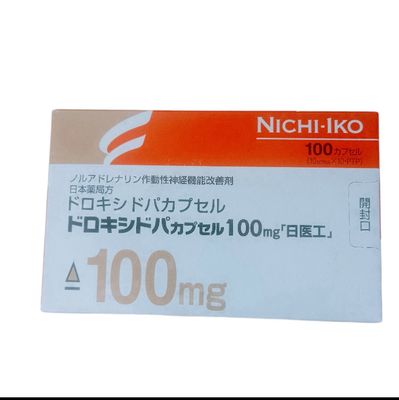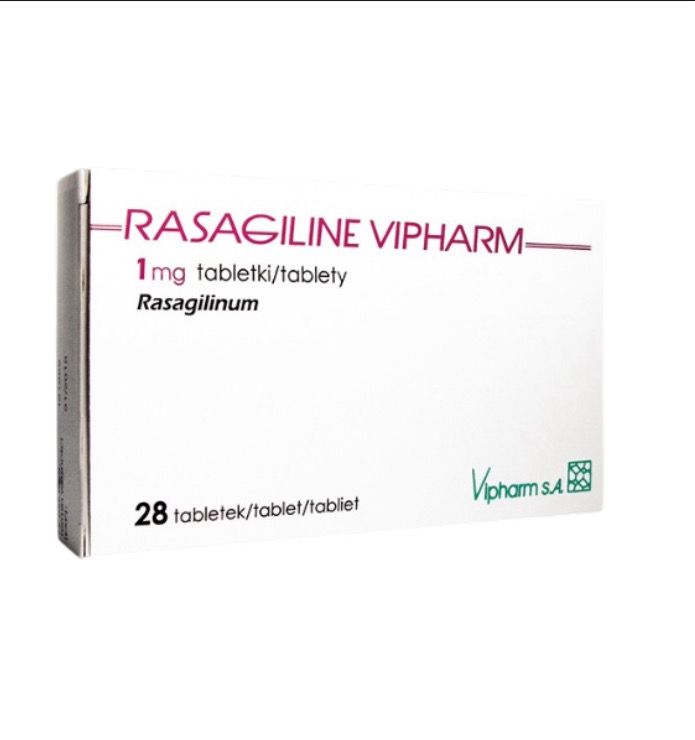Rasagiline 1 mg 28 tablets
36,00 €
Parkinson's disease
In stock
Save this product for later
Customer reviews
Reviews only from verified customers
No reviews yet. You can buy this product and be the first to leave a review.
Rasagiline 1 mg 28 tablets
Product Details
Rasagiline 1 mg 28 tablets
Rasagiline Vipharm is indicated for the treatment of idiopathic Parkinson's disease as monotherapy (without levodopa) or as maintenance therapy (with levodopa) in patients with fluctuations in the effectiveness of levodopa as a result of the effect of dose depletion.
Composition:
Each tablet contains 1 mg of rasagiline (in the form of 1,438 mg of rasagiline semi-acetate).
Dosage
Rasagiline is administered orally, at a dose of 1 mg once a day, with or without levodopa. The drug can be taken with a meal or independently of a meal.
Elderly people
There is no need to change the dosage in the elderly.
Children and teenagers
Rasagiline Vipharm is not recommended for children and adolescents due to the lack of data on safety and efficacy of use.
Patients with impaired liver function
The use of rasagiline is contraindicated in patients with severe liver failure. The use of rasagiline should be avoided in patients with moderate hepatic insufficiency. Caution should be exercised when starting the use of rasagiline in patients with mild hepatic insufficiency. If mild hepatic dysfunction develops into a moderate form, rasagiline should be discontinued.
Patients with renal insufficiency
There is no need to change the dosage in case of renal failure.
Safety precautions:
Simultaneous use of rasagiline and fluoxetine or fluvoxamine should be avoided. At least five weeks should elapse between discontinuation of fluoxetine and the start of treatment with rasagiline. At least 14 days should elapse between discontinuation of rasagiline and the start of treatment with fluoxetine or fluvoxamine.
Patients treated with dopamine agonists and/or other dopaminergic drugs may develop impulse control disorders. Similar reports of impulse control violations were also received after the marketing of razagiline. Patients should be monitored regularly for the development of impulse control disorders. Patients and their caregivers should be informed about the behavioral symptoms of impaired impulsive control observed in individuals treated with rasagiline, including cases of compulsions, obsessive thoughts, pathological gambling addiction, increased libido, hypersexuality, impulsive behavior, compulsive spending or unbridled purchases.
Since rasagiline enhances the effect of levodopa, the side effects of levodopa can be aggravated and aggravated by pre-existing dyskinesia. Reducing the dose of levodopa may alleviate these side effects.
Cases of hypotensive effect have been reported with simultaneous use of rasagiline and levodopa. Patients with Parkinson's disease are particularly susceptible to side effects associated with low blood pressure due to gait disorders.
Simultaneous use of rasagiline and dextromethorphan or sympathomimetics, such as those included in decongestants injected into the nose and orally, or cold remedies containing ephedrine or pseudoephedrine, is not recommended.
The occurrence of melanoma cases during clinical trials suggested a possible connection with the use of rasagiline. The information collected indicates that Parkinson's disease, rather than the use of any particular drug, is associated with an increased risk of skin cancer (not just melanoma). Any suspicious skin lesion should be examined by a specialist.
Caution should be exercised when starting the use of rasagiline in patients with mild hepatic insufficiency. The use of rasagiline should be avoided in patients with moderate hepatic insufficiency. If mild hepatic dysfunction develops into a moderate form, rasagiline should be discontinued.
Contraindications:
Hypersensitivity to the active substance or to any auxiliary substance.
Concomitant treatment with other monoamine oxidase (Mao) inhibitors (including over-the-counter medicines and herbal remedies, such as St. John's wort) or pethidine. At least 14 days should elapse between discontinuation of rasagiline and the start of treatment with MAO inhibitors or pethidine.
Rasagiline is contraindicated in patients with severe liver failure.
Manufacturer:
VIPHARM SA Poland
Ask a question or inquire about delivery to your country
You May Also Like

Droxidopa 100 mg (Nichi-Iko) 100 caps.
Droxidopa 100 mg (Nichi-Iko) 100 caps.
Drug for the treatment of Parkinson's disease
136,00 €
Display prices in:EUR

